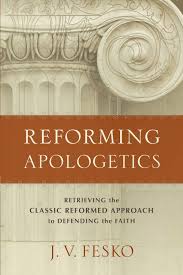Book Review: Reforming Apologetics (1)


Reforming Apologetics: Retrieving the Classic Reformed Approach to Defending the Faith, J.V. Fesko. Grand Rapids: Baker, 2019. Softcover, 250 pages.
This much-anticipated volume begins with a bit of autobiography. J.V. Fesko relates how Josh McDowell’s Evidence That Demands a Verdict impacted him shortly after graduating from college. It spurred him on to study apologetics in seminary and beyond. We all travel a route to our convictions and I am no different. My study of apologetics began in a humanistic and anti-Christian university environment. I needed help in dealing with the regular attacks on the Christian faith from the lectern, questions from fellow students, and sometimes my own doubts. God’s providence led me to Cornelius Van Til’s book The Defense of the Faith. I devoured it over a summer break. And I savoured it. It rocked my world – I would not say it turned my world upside down so much as turning it right side up. I grew up in a Reformed church and here was a Reformed author trying to apply the Reformed theology I loved to apologetics. For me, the most important point of all was that, not only in apologetics, but in everything, we must start with God’s inerrant Word. That made a deep impression on me that I will never be able to escape, nor would I want to.
I have encountered other critiques of Van Til and presuppositional apologetics. In my university days, I read the well-known volume of Sproul, Gerstner and Lindsey, Classical Apologetics: A Rational Defense of the Christian Faith and a Critique of Presuppositional Apologetics. In a time when I might yet have been easily persuaded, it did not. Around the same time, I listened to Greg Bahnsen debate R.C. Sproul on apologetical method. By the end of this cordial debate, Bahnsen had Sproul conceding some key points. Obviously Sproul was not going to convince me on that occasion either.
However, this new critique by J.V. Fesko piqued my interest. I have greatly appreciated work he has done in defence of the Reformed doctrine of justification. He is a pastor in the Orthodox Presbyterian Church, the church of Bahnsen and Van Til. He’s been a professor at Westminster Seminary in California. His book has a hearty endorsement from Richard Muller – someone whom I respect highly and from whom I have learned much about historical theology. Would an author with these credentials cast Van Til in a critical, but more accurate light?
This book is a critique. Critiques are often met with accusations of misconstrual, misunderstanding, and worse. But what to do when reviewing a book and the author actually does seem to misunderstand some or much of what his opponents are saying? I read Fesko and I found myself saying, “Either I have always profoundly misunderstood presuppositionalism or he has.” One of us is wrong about some of presuppositionalism’s basic tenets.
As the subtitle indicates, Fesko wants to take readers away from presuppositionalism and back to the “classic Reformed approach to defending the faith.” For him, that means recovering the “book of nature” in apologetics. In other words, he argues for greater attention in Reformed apologetics to natural theology or “the light of nature.” He believes that Van Tillian presuppositionalism has unnecessarily shelved (or at best minimized) the usefulness of the book of nature.


